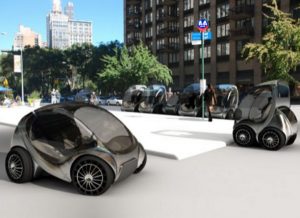 As I discussed last month during a workshop in Sacramento with colleagues, the “urbanization” trend with traffic congestion and air pollution is driving policy changes and increased use of transportation alternatives such as carsharing and ridesharing. Starting in this week’s Green Auto Market, a new department will join the Top 10 clean transportation stories: Advanced Transportation & Urban Mobility. Along with following companies such as Lyft, Uber, Zipcar, and Car2go, other topics that will be tracked and analyzed will include: autonomous vehicles, smart transportation, advanced vehicle technologies, Hyperloop and bullet trains, intelligent transportation systems, and connected cars. Here are some interesting advanced transportation developments over the past week………
As I discussed last month during a workshop in Sacramento with colleagues, the “urbanization” trend with traffic congestion and air pollution is driving policy changes and increased use of transportation alternatives such as carsharing and ridesharing. Starting in this week’s Green Auto Market, a new department will join the Top 10 clean transportation stories: Advanced Transportation & Urban Mobility. Along with following companies such as Lyft, Uber, Zipcar, and Car2go, other topics that will be tracked and analyzed will include: autonomous vehicles, smart transportation, advanced vehicle technologies, Hyperloop and bullet trains, intelligent transportation systems, and connected cars. Here are some interesting advanced transportation developments over the past week………
- The global electric vehicle racing event, Formula E, will be adding an autonomous electric car race next year. RoboRace will launch one-hour races designed to test artificial intelligence. These races will have 10 teams and 20 cars competing, and will take place on the same day and racing circuits as the Formula E championship. Kinetik, the company that will build all the cars for RoboRace, is “trying to make them better than humans. So it means we expect the cars will have high acceleration and high speeds,” said Denis Sverdlov of Kinetik.
- Amazon CEO Jeff Bezos is taking on SpaceX and Tesla Motors CEO Elon Musk. Blue Origin, based in Kent, Wash., and founded by Bezos, launched a rocket into space and landed it back on earth vertically on Monday of last week. While SpaceX was able to vertically land a rocket two years ago, that rocket hadn’t gone out into space. Blue Origin’s New Shepard rocket reached 329,839 feet before returning to touch down on its Van Horn, Texas concrete landing pad. That rocket can be reused and may increase the frequency of launches; Bezos would like to carry tourists as well as cargo payloads into space. SpaceX does have an edge over Blue Origin on carrying payload. Blue Origin hasn’t been used yet for carrying a payload while SpaceX’s rockets have been used for commercial, military, and NASA payload launches since 2012. SpaceX will be taking its first human transport mission to the International Space Station in late 2017.
- Uber is moving forward in navigation technology through agreements with TomTom and Microsoft. Uber will use TomTom’s maps and traffic data for its ridesharing service. Uber also acquired Microsoft’s mapping technology and the key personnel that came with it. Earlier this year, Uber also acquired veteran location industry company deCarta. Mapping data is expected to be key in Uber’s strategy to be a major player in autonomous vehicle technology.
- The number if people using carsharing services is expected to mushroom over the next five years. Berg Insight predicts that the number of people around the world using carsharing services will grow from 6.5 million this year to 26 million in 2020. The number of vehicles used in carsharing is expected to grow from 123,000 cars today to 450,000 by the end of 2020. Technologies such as telematics systems and smartphones will support this growth, along with expansion of one-way carsharing that enables users to return the car to any station operated by the carsharing firm. Carsharing growth will also come through new markets accessed by major and local carsharing services; and through car-based mobility services from car rental, carpooling, ridesharing, taxi, and ridesourcing services.
- Daimler’s carsharing service, Car2Go, is testing out a promotion to grow its membership. From now through Dec. 6, Car2Go is reducing its sign-up fee for new members from $35 to $5, and adding 60 minutes of free travel time. In addition, existing members will see the per-minute fee for signing out a car drop from 41 cents to 19 cents. Paul DeLong, the carsharing service’s CEO and president, sees the program as a way to both recruit new members and inspire existing members to use the service more regularly – and to compete with ridesharing services Uber and Lyft, which have been taking away market share. It should also help improve community relations in its home market of Austin; Car2Go had downsized its presence in the market, which received criticism from users who found their home or office suddenly cut out of the service area.



